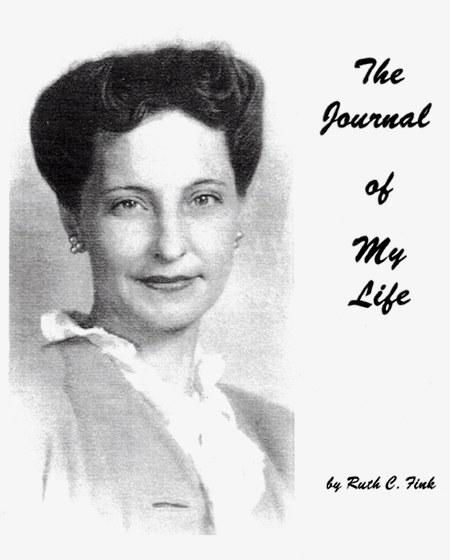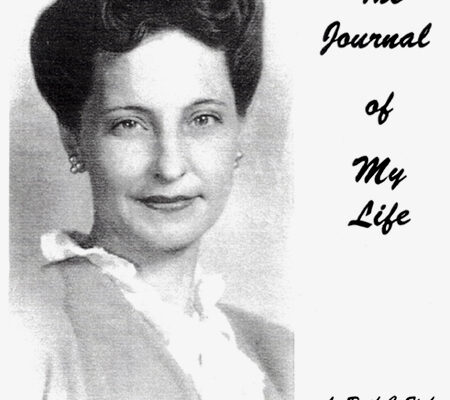Ruth Cacy Fink has a 94-year story to tell that chronicles her long life in East Tennessee. The Johnson City resident wisely documented her remembrances in a 21-page well-written journal.

Three of Ruth’s family members contributed to the project: Judy Steven (niece who urged her to write her memories and who was impressed that she raised two children during the Depression years without government help), Patsy Hayes (daughter who published her work) and Julia Rhees (granddaughter who videotaped an interview with her and made DVDs from it.
Ruth became quite animated as she related her memoirs: “I was born on July 20, 1915 in Dante, Virginia. My parents, George Beverly Cacy and Virginia Belle Steele Cacy, had eight children. I was the youngest of three boys and five girls. Mother married very young. She died a few days before Christmas in 1916 when I was only 17-months-old. My 16-year-old sister, Jessie, and a black lady who we called Aunt Sally, who stayed with us, helped raise me.”
Ruth shared several prized family items. They included the only photo she has of her mother that was taken at about age 35, a letter her mother wrote to her husband before Ruth was born and letters from two sisters, Lulu and Jessie, and two brothers, Garnet and Basil, written to their father asking him to come home to a church baptism and dinner on the ground that day. Mr. Cacy was working in the shops of the Clinchfield Railroad and came home only on weekends.
When Ruth was about three years old, the railroad transferred her father to Erwin, Tennessee after he severely injured his leg when accidentally stepping into an open manhole, leaving him with a noticeable limp. According to her, “We lived on Main Street across from where the old YMCA is now located. We children used to get in the front porch swing and sing and swing until our bare feet hit the ceiling. A railroad man often came by and taught us songs.
“Occasionally, hobos come by our house in search of a meal or wanting work. My sister would go inside, fix them a plateful of food and let them sit on the back steps to eat.
“We were living on First Street in Erwin when our house burned. The only thing saved was the piano and a statue that sat on top of it. After that, we began living in rental houses that Papa located for us. When he moved into one of them, he made so many house improvements that the landlord would eventually sell it, forcing us to find another rental house.
“I attended a one-room school for grades 1-8, with each row of seats designated for a different grade. I recall receiving a “box supper”one day at school. One of the teacher’s brothers bought one for my niece, Pauline, and me. I was so shy I do not think I ate very much of it.
“My sister and I occasionally rode the passenger train from Erwin to St. Paul, Virginia where she lived. I stayed at her house a while and then rode the train back home. Daddy gave us free railroad passes to use. Occasionally, we took the train to Elkhorn to view the scenery. I rode the Tweetsie Railroad a few times. About twice a week, locals traveled by train from Erwin to Johnson City to shop at downtown businesses.
“During the Great Depression, Papa was only able to work about twice a month. To make ends meet, he raised chickens and planted a garden. The happy times from that era were when we moved near the Fishery on the other side of the railroad tracks. When the fishponds froze in the winter, we went ice-skating. Pauline and I were so young we did not do much skating because we kept running home to get warm. I went to Sunday School at the Fishery in a little one-room church on the hill. We had fun picking persimmons on the way home. We lived in this community for about a year.
“In 1935, I graduated from Unicoi County High School. After I was grown, Papa retired from the railroad and we moved from Erwin to Johnson City. I married Robert Fink in 1937, but the marriage lasted only 4 years. Afterward, I moved in with my daddy on Myrtle Avenue just a short distance from Roan Street. He rented an apartment upstairs. His first monthly Social Security check was $18. My son paid $5 for our first car. I took it home and put it in the backyard where he disassembled it, replaced parts and got it running.”
Ruth recollected several downtown Johnson City businesses in the early 1940s: Penney’s, King’s, Charles Store, Masengill’s, Home Federal Savings and Loan, Walker Furniture Store, Siler’s, Travis Kinkead’s Flowers, S.H. Kress, Woolworth's, McLellan’s, Betty Gay, Hannah’s, The Chocolate Bar, Thomas Ladies’ Shop, Thomas Men’s Shop and the Squire Shop.
Over time, Ruth worked for numerous area businesses: Walter Martin Agency (insurance), a service station owned by Carl Young (also owned The Little Store), Montgomery Ward (was credit manager), Walker Furniture Company, Baylor-Nelms Furniture Company (Kingsport) and Swift & Company (during the war years). The latter one supplied meat to the Spot and Dixie Barbeque restaurants.
Ruth recalled when her father and stepmother, Allie, once worked at the John Sevier Hotel. He was employed in the shops maintaining the hotel’s equipment; she was a telephone switchboard operator. Monroe McArthur was hotel manager.
Mrs. Fink concluded her journal with the words: “This is the best I can do with this story. I hope you can make sense out of it.” This family did a superb job of preserving Ruth’s story, both in a journal and on video. Thank you Ruth Fink for the memories.
